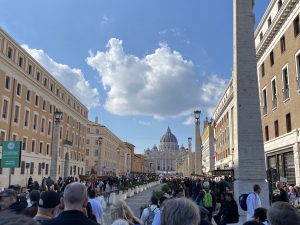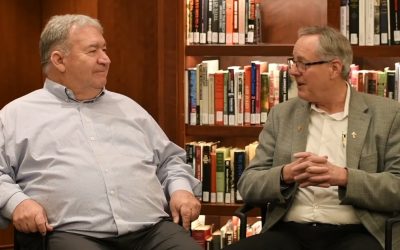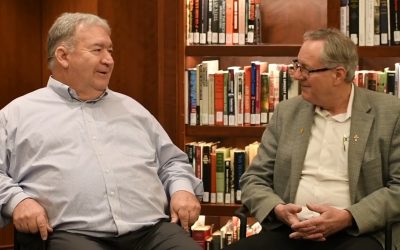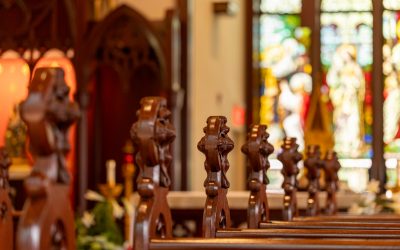
Pilgrims Journeying toward the Holy Doors at St. Peter’s Basilica during the Jubilee Year of Hope
Pope Francis was a deacon.
Indeed, we could say that every pope is a deacon.
The deacon is the lowest of the three orders of the sacrament of Holy Orders, with priest being the second order and bishop being the highest order. When you are ordained a deacon, we Catholics believe that it leaves a permanent mark on your soul. So, we can say that since every bishop (and priest) was ordained a deacon first, that diaconal mark stays with him all his life.
How is that diaconal quality lived? A man ordained to the diaconate is conformed to Christ the Servant. He is what Pope St. John Paul II often called the Church’s sacramental (outward) sign of its mission to serve. To be effective in ministry, a deacon must humbly and freely offer the gift of himself to those around him. His calling is to serve God’s people from the standpoint of Liturgy, Word and Charity. And that calling is not necessarily limited to parishioners at his parish – to live as Christ the Servant is to minister to all those we come into contact with, be they relatives, co-workers or strangers on the street.
This is where Pope Francis comes in. What stands out so obviously in my mind when I think of his papacy is how much his ministry mirrored what a Catholic deacon’s should be. Of course, he constantly reminded all of the faithful of our obligation to serve those on the peripheries – the margins. As he said before the conclave that eventually elected him pope: “The Church is called to come out of herself and to go to the peripheries, not only geographically, but also the existential peripheries: the mystery of sin, of pain, of injustice, of ignorance and indifference to religion, of intellectual currents, and of all misery.” This was a consistent message throughout his papacy.
His message of the primacy of service particularly resonates with deacons. In a homily given in 2016, the Pope said: “We are not called to serve merely in order to receive a reward, but rather to imitate God, who made Himself a servant for our love. Nor are we called to serve only now and again, but to live in serving. Service is thus a way of life; indeed it recapitulates the entire Christian way of life: serving God in adoration and prayer; being open and available; loving our neighbor with practical deeds; passionately working for the common good.”
That quote encapsulates the ministry of deacon. In February 2025, deacons of the world gathered in Rome for their Jubilee year Mass. In his homily, Pope Francis wrote: “For you as deacons, selfless service is not a secondary aspect of your activity, but an essential dimension of your very being. Indeed, through your ministry, you devote yourselves to being ‘sculptors’ and ‘painters’ of the merciful face of the Father, and witnesses to the mystery of the Triune God.”
Pope Francis was especially gifted at backing up what he said in gestures and actions. Taking Jesus’ washing of the feet of the apostles as his model, he typically went on Holy Thursday to a prison or homeless shelter or other place where people on the margins of society might be and washed the feet of the residents or inmates. What is so striking about this to me is that before he would wash their feet, he would take his stole (which a priest or bishop wears around the back of the neck with the ends hanging down in front of them) and rearrange it to be a deacon stole – that is, worn over one shoulder and the opposite hip so that it appears diagonally across the chest. With this simple action, he emphasized the church’s mission of service for every Catholic, be they pope, bishop, priest, deacon or layperson.
In that Jubilee homily to deacons, he wrote: “Through your cooperation and generosity, you will be a bridge linking the altar to the street and the Eucharist to people’s daily lives.” Pope Francis fulfilled that role of linking the altar and the street, and thus, he was a consummate example of deacon.




0 Comments